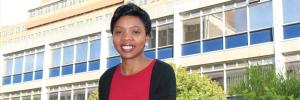
Specialist training to enhance healthcare in Africa
The Faculty of Medicine and Health Sciences (FMHS) at Stellenbosch University (SU) and Tygerberg Hospital have an excellent reputation in the training of supernumerary registrars. With this inititiative, specialist training is made available to clinicians from other developing countries in Africa, thereby expanding the availability of specialist healthcare in Africa.
Dr Doris Kayambo, a supernumerary registrar at the Department of Obestetrics and Gyneacology at the FMHS who passed her Fellowship examination this year and plans to submit her thesis next year, spoke highly of the training she received.
“The structured programme ensured that I was exposed to rotations through all the subspecialities and the personalised training by the consultants enabled me to excell,” she said.
“My colleagues at the FMHS and Tygerberg Hospital, especially Profs Hennie Botha and Gerhard Theron, were beyond supportive,” Kayambo said.
Kayambo, who hails from Malawi, is eager to return to her country to apply the knowledge gained during her training as supernumery registrar. “I want to be a clinician and at the same time add value to the healthcare scenario in Malawi. As we are also a developing country, the healthcare infrastructure, policies and programmes are still lacking in some areas.”
She explained that a large part of Malawi’s burden of disease involves obstetrics- and gynaecology-related conditions. “For instance, many cases of cervical cancer is not detected early and facilities for radiation treatment are not yet available in Malawi. This leads to a high mortality rate amongst women, which could be addressed with an increase in specialised gyneacological services.”
Kayambo studied at the College of Medicine of the University of Malawi and subsequently worked in district hospitals for three years. She spent two of the three years as a district health officer.
“It is not easy to leave your family and friends behind and live in a foreign country for four years,” Kayambo said. However, at a critical time and with the assistance of the Margaret Macnamara Memorial Fund and support structures at the FMHS, she managed to achieve success.
